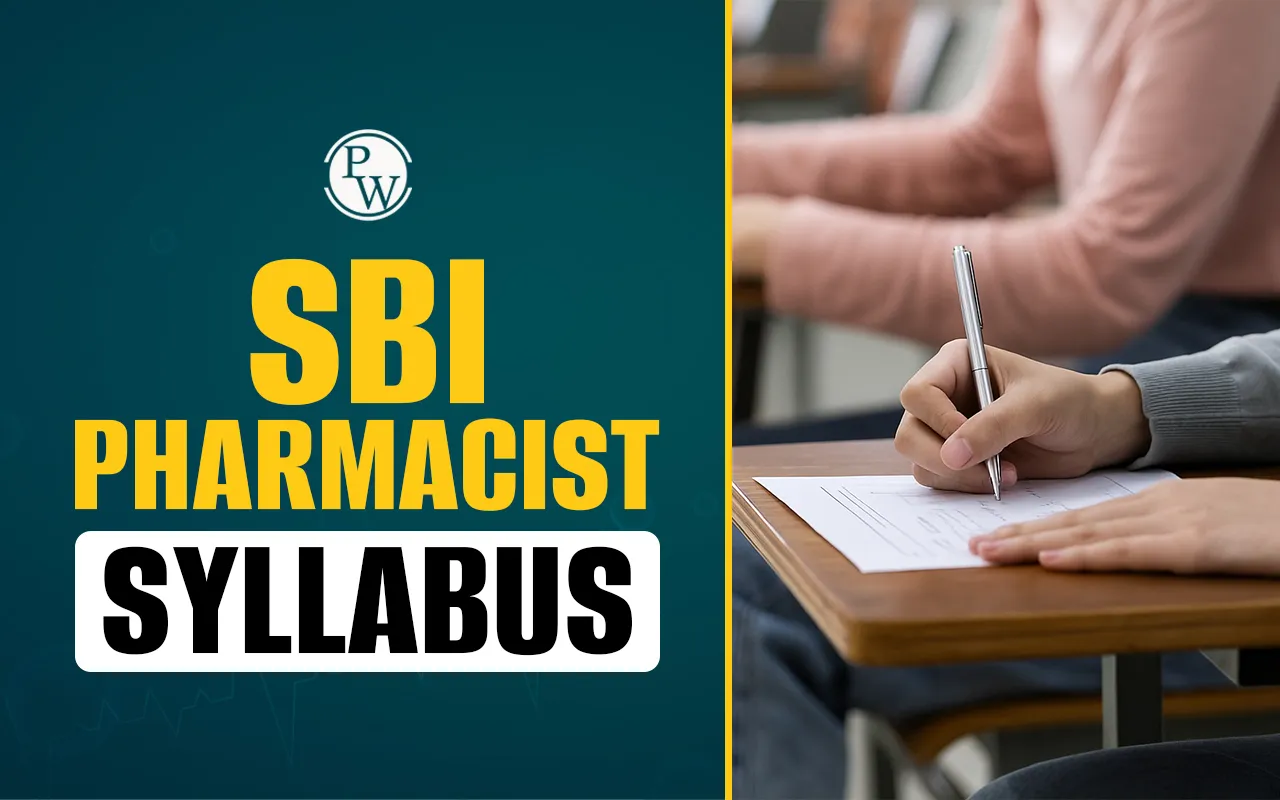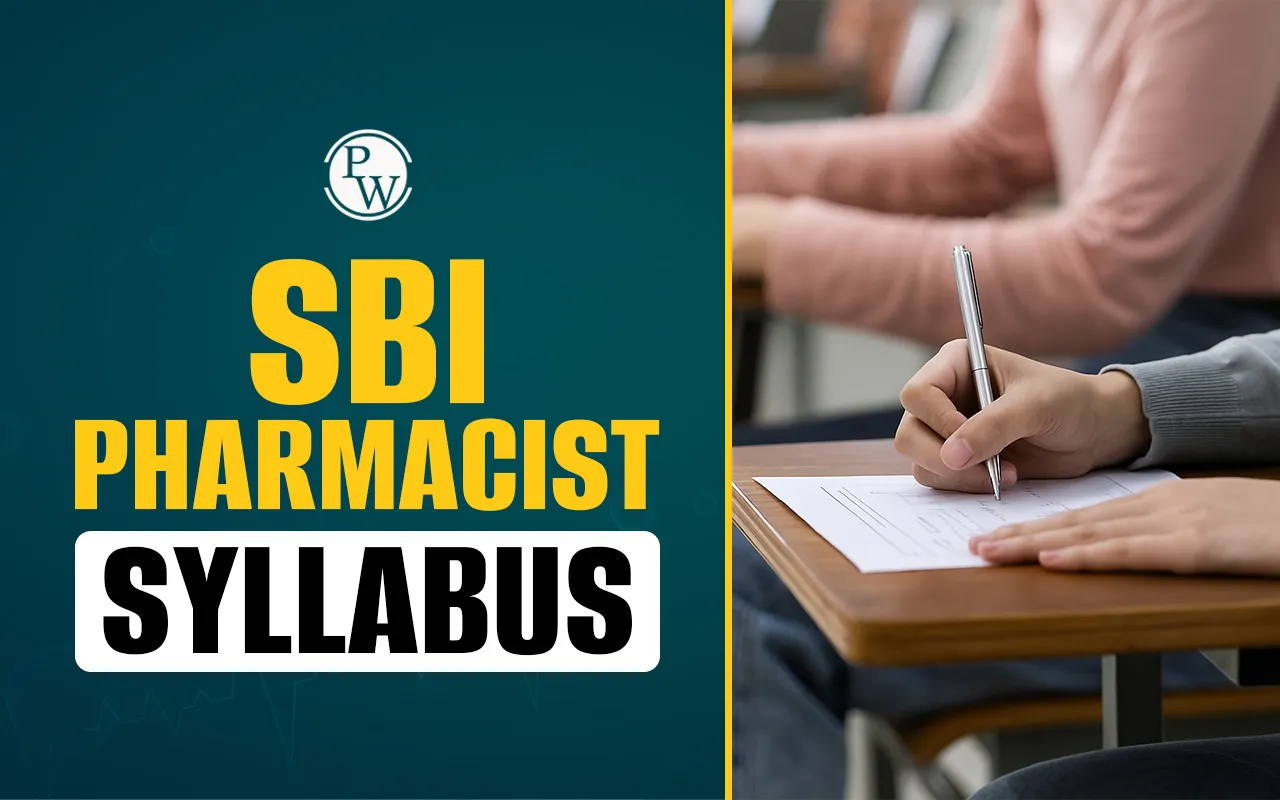

SBI Pharmacist Syllabus is split into five main parts: General English, Quantitative Aptitude, Logical Reasoning, General Awareness, and Professional Knowledge. The exam is an Online Test conducted by the State Bank of India. It has 150 questions for a total of 200 marks, which you must complete in 120 minutes.
The most important section is Professional Knowledge, which alone carries 100 marks. Knowing the full SBI Pharmacist Exam Pattern is necessary for good preparation. There is a penalty of 0.25 marks for every wrong answer, so you must answer questions carefully. Focus your study on the core Pharmacy subjects to score high.
SBI Pharmacist Syllabus Overview
The State Bank of India (SBI) hires Pharmacists for clerical jobs. If you are a Graduate Student, this is a great career path. To get this job, you must pass an online written exam and an interview. Knowing the SBI Pharmacist Syllabus is the first big step. The syllabus tells you exactly what to study. It helps you plan your study time smartly.
| SBI Pharmacist Syllabus Overview | |
| Particulars | Details |
| Conducting Body | State Bank of India (SBI) |
| Post Name | Pharmacist (Clerical Cadre) |
| Exam Level | Graduation/Diploma Level |
| Exam Mode | Online (Computer-Based Test) |
| Official Website | https://sbi.co.in/careers |
SBI Pharmacist Syllabus PDF
The SBI Pharmacist Syllabus PDF contains all topics in one place. You must use this PDF to guide your study. It makes sure you do not miss any key topic. You can download the syllabus from the official SBI website. Look for the "Careers" section on the website. A strong study plan must follow the structure of the SBI Pharmacist Syllabus.
SBI Subject Wise Syllabus
The SBI Pharmacist Syllabus has five main subjects. Four sections are common for most banking exams. The fifth section, Professional Knowledge, is the most important part. This section deals with your core Pharmacy education.
SBI Pharmacist Syllabus: General English
This section checks how well you use the English language. Questions are simple and check basic skills. Focus on grammar rules and building your word knowledge:
-
Reading Comprehension: Read a passage and answer questions about it.
-
Cloze Test: Fill in the blanks in a passage with correct words.
-
Error Spotting: Find grammatical mistakes in sentences.
-
Sentence Improvement: Choose the best way to rewrite a part of a sentence.
-
Para Jumbles: Arrange parts of a sentence or paragraph in the correct order.
-
Fill in the Blanks: Use proper vocabulary to complete the sentence.
SBI Pharmacist Syllabus: Quantitative Aptitude
This section checks your basic math skills. You must practice speed and accuracy for this part. The questions will be of a 10th-grade level, mostly. Practice problems daily to improve your score:
-
Simplification and Approximation: Quickly solve easy and slightly complex math problems.
-
Number Series: Find the next number in a sequence or the wrong number.
-
Data Interpretation (DI): Read and understand data from tables and graphs.
-
Quadratic Equations: Solve equations to compare two quantities.
-
Arithmetic Topics: Questions from Percentage, Profit and Loss, Ratio, Time and Work, and Simple/Compound Interest.
SBI Pharmacist Syllabus: Logical Reasoning
Reasoning ability checks how well you think logically. This section is all about puzzles and patterns. Learn the rules for each type of puzzle. This is an important part of the overall SBI Pharmacist Syllabus:
-
Puzzles and Seating Arrangement: Arrange people or items based on given conditions.
-
Inequality: Compare elements using symbols like >, <, or =.
-
Syllogism: Decide if conclusions follow from two or more statements.
-
Coding-Decoding: Find the rule to convert words or numbers into codes.
-
Blood Relations: Understand and solve family relationship problems.
-
Alphanumeric Series: Solve questions based on a mix of letters, numbers, and symbols.
SBI Pharmacist Syllabus: General Awareness
General Awareness includes two main parts: Current Affairs and Banking Awareness. You must read the newspaper every day. This section helps score quick marks.
-
Current Affairs: Important national and international news from the last six months.
-
Banking and Financial Awareness: Knowledge about SBI, RBI, banking terms, and financial systems.
-
Government Schemes: Know about new schemes launched by the central government.
-
Static GK: Basic facts about history, geography, and the Indian Constitution.
-
News: Focus on news related to drugs, health, and the pharmacy sector.
SBI Pharmacist Syllabus: Professional Knowledge
This is the core of the exam and carries the highest marks (100 marks). Your success depends on your knowledge here. The SBI Pharmacist Syllabus for Professional Knowledge covers your degree topics. You must spend the most time studying these subjects.
-
Human Anatomy and Physiology: Study the structure and function of the human body.
-
Pharmaceutical Analysis: Learn about testing and analyzing drug quality.
-
Pharmaceutics: Focus on dosage forms, drug delivery, and preparing medicines.
-
Pharmaceutical Chemistry: Study Inorganic and Organic Chemistry related to drugs.
-
Pharmacology and Toxicology: Understand how drugs work in the body.
-
Health Education and Community Pharmacy: Learn about public health roles of a pharmacist.
-
Hospital and Clinical Pharmacy: Study pharmacy services in a hospital setup.
-
Pharmaceutical Jurisprudence: Know the laws and ethics related to pharmacy practice.
-
Drug Store and Business Management: Understand managing a pharmacy store.
SBI Pharmacist Exam Pattern
SBI Pharmacist Exam Pattern is important to understand the test structure. It tells you the total time and marks for the exam. The test is an online exam. You will get objective-type, multiple-choice questions (MCQs).
| SBI Pharmacist Exam Pattern | |||
| Section | Questions | Marks | Time Allotted |
| General Awareness | 25 | 25 | 120 minutes (2 Hours) |
| General English | 25 | 25 | |
| Quantitative Aptitude | 25 | 25 | |
| Reasoning Ability | 25 | 25 | |
| Professional knowledge | 50 | 100 | |
| Total | 150 | 200 | |
SBI Pharmacist Marking Scheme
Knowing the SBI Pharmacist Marking Scheme is key to attempting questions. You get marks for correct answers. You lose marks for wrong answers.
-
Correct Answer: You get 1 mark for General sections. You get 2 marks for Professional Knowledge.
-
Incorrect Answer: There is a penalty for wrong answers. 0.25 marks are cut for every wrong answer.
-
Unattempted Questions: There is no penalty for questions you do not answer.
Avoid guessing the answer if you are not sure. This negative marking can lower your total score. The final selection depends on your marks in the written test and the interview.
Preparation Tips to Cover SBI Pharmacist Syllabus
You can easily cover the SBI Pharmacist Syllabus with a good plan. Graduate Students must start early. Make a daily study routine and stick to it strictly.
-
Prioritize Professional Knowledge: This section has the highest weightage (100 marks). Dedicate most of your study time here.
-
Practice Speed Tests: Solve mock tests and previous papers. This helps you manage time in the real exam.
-
Learn Basic Concepts: For Quant and Reasoning, practice basic problems first. Speed comes after you understand the basics well.
-
Make Notes: Write down important formulas and pharmacy facts. Quick review notes help before the exam.
-
Read Daily News: Read about current events and banking news for the General Awareness section.
-
Review the SBI Pharmacist Exam Pattern: Always keep the structure in mind while practicing.



